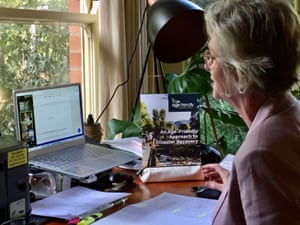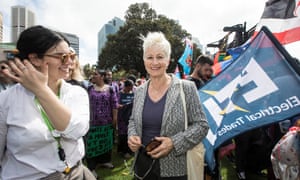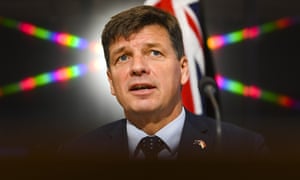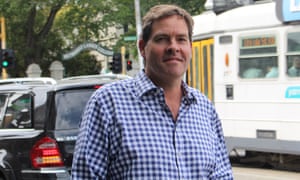Australia’s independent movement is gaining traction. Inspired by the success of Warringah’s Zali Steggall and Indi’s Helen Haines in 2019, the next federal election could see up to a dozen safe Coalition seats facing serious, well-organised challenges.
The motivations vary: the lack of action on climate change, the tenor of modern politics, mining being put ahead of farming, or simply the calibre of the local member who’s kept a safe seat warm for years.
Some groups are determined to field a candidate. Others are still feeling their way, believing there may be other methods to nudge mainstream candidates into being more responsive to their communities.
Dave Sharma – the Liberal member in the New South Wales seat of Wentworth – almost certainly faces an independent challenge. But groups but are mobilising all across the state – in MacKellar, North Sydney, Hughes and Hume, all blue-ribbon Liberal seats.
Nationals leader Michael McCormack could face a serious independent challenge in his seat of Riverina in southern NSW. Independents could also emerge in Barnaby Joyce’s seat of New England, and in Mallee, where independents have been elected previously.
In Victoria, Haines is planning to again contest Indi and independents are eyeing Kooyong, currently occupied by the treasurer, Josh Frydenberg, and Goldstein, Tim Wilson’s seat.

The role models
Steggall campaigned and won the NSW seat of Warringah in 2019 on a platform of more action on climate change as well as a more civil public discourse. This month her private member’s bill was tabled and is now before a Senate committee which is inviting submissions.
“I am trying to be much more collaborative on climate policy, which is used more frequently as a tool to wedge the other side,” she says.
“I firmly believe there is an opportunity after the challenges of 2020 to do it differently.”
Haines has kept up the pressure for a federal integrity commission with teeth by advancing her own bill, filling the void after the government delayed draft legislation. It finally produced one two weeks ago, but it has been criticised by experts as too weak.
Steggall will re-contest Warringah and unless someone of the stature of former NSW premier Mike Baird runs for the Liberals, she has a good shot at a second term – even without the galvanising presence of Tony Abbott.
“I would strongly encourage people to think about running, if they want to change the culture of politics which has been revealed to be especially toxic to women,” she says.
Kitchen table organising
Steggall was backed in 2019 by Voices of Warringah, which drew on the experience of Voices4Indi organising through small group discussions around the kitchen table.
Once they reached critical mass in Warringah, several groups came together to find a candidate to run against the polarising former prime minister Tony Abbott.
Steggall says she still has more than 800 active volunteers who can be called out at short notice – a sign that she is not just a flash in the pan – and she is busy helping others replicate her success.
“I think among the independents there is a willingness to share information. A number of community organisations are reaching out, voicing dissatisfaction with the current state of politics and asking how to organise a campaign,” Steggall says.
Some more established groups, like Voices of Wentworth, are holding regular town halls on issues. Covid has limited in-person gatherings to 60, but these are often supplemented with Zoom.

The Voices of Wentworth “book club” next week – featuring two local authors, including Marian Wilkinson and her book The Carbon Club – is a sellout.
“This is a transitional time for the independent movement, it’s becoming a force for change,” says Kerryn Phelps, the former independent who narrowly lost to Sharma in 2019. She points to her success with the Medevac bill, Stegall’s climate bill and Haine’s integrity commission bill.
Sharma disagrees.
“Only the major parties can deliver major reforms. Independents make much noise but deliver very little,” he told the Guardian.
“I’m proud of what I’ve been able to achieve within the government and the parliament. I campaigned on keeping us in Paris and accelerating our transition to a lower-emissions future. As a government we are now committed to net zero emissions as soon as possible, and we will aim to forego our Kyoto credits,” he said.
It is unclear whether Phelps will run again, but the Voices of Wentworth has some unexpected, high-profile supporters, such as former lord mayor Lucy Turnbull, who is also the wife of Malcolm Turnbull.
Lucy Turnbull AO
(@LucyTurnbull_AO)Looks like lots of good ideas are coming from the independents this term of parliament- on Integrity commission, Code of Conduct and Climate leg. Good to see more momentum to civilise the #CanberraBubble and catch up with the world on #ClimateAction https://t.co/doPzig3KES
Some of the newer groups are at an early phase, gathering in people’s homes to discuss and organise. Most of the “Voices of” groups are following the Warringah model and beginning with kitchen table discussions about politics, community and the issues that matter locally.

The Voices of Hume, in the seat of energy minister, Angus Taylor, says it got 100 members in less than one week of launching.
In McCormack’s seat of Riverina, the frustration of not being heard has spurred Voices4Riverina.
About 18 months ago, Wagga Wagga general practitioner and obstetrician Trudi Beck was involved in a campaign for her local council to declare a climate emergency.
The push, which followed the heatwave of the 2018-19 summer, made national headlines and initially resulted in Wagga Wagga city council voting in favour of the motion. Two weeks later, after an increasingly hostile debate, the declaration was rescinded five votes to four.
While the motion might have ultimately failed, Beck’s experience of the campaign showed what was possible when community members organised to have a greater say in government.
She and nine other residents contacted Denis Ginnivan, one of the founding members of Voices 4 Indi, for advice.
“He could see the challenges we were facing were similar to a lot of the challenges Indi had faced,” Beck says.
Voices4Riverina was formed in June this year and for the past six months, its 10 committee members have been hosting “kitchen table conversations” with residents across an electorate that spans from Lockhart and Wagga Wagga, out to Cowra and up to Parkes.
The committee includes a farmer, an academic from the university, an agricultural researcher, a hospitality business owner, a pharmacist, a doctor, an IT professional and an organic grocer.
Their intent is not necessarily to run candidates for parliament but to ensure representatives at all levels of government do more to deliver what their communities actually need.
Marshalling against the moderates
A new development this time around is that some of the Liberal party’s most moderate members are facing potential challenges: Trent Zimmerman in North Sydney, Jason Falinski in Mackellar and Dave Sharma in Wentworth (again).
Voices of Mackellar began holding meetings a while ago, but Covid intervened. They are now back to twice a week and the numbers are growing, says convener Leonie Scarlett.
“People feel disenfranchised with the whole system. The concern about climate change is off the scale, but the overriding thing is community,” she said.
Voices of Mackellar has not yet decided on its strategy, but is trying to engage with the local candidates rather than field its own.
In Zimmerman’s seat of North Sydney, however, the goal of displacing the sitting MP is explicit. One group is called “Time’s up Trent”.
“The moderate Liberals are trapped in the party discipline. Trent can’t vote the way he talks and thinks on climate change,” says convener Denise Shrivell.
“People don’t realise they vote as a bloc. When I tell them Trent Zimmerman votes the same way as Peter Dutton or Craig Kelly, they are shocked,” she says.
When the Guardian contacted Craig Kelly to ask him about the prospect of an independent running in his NSW seat of Hughes, he said: “It’s really just an offshoot of the Greens and the Greens have traditionally had a low vote in Hughes.”
Another sitting member, who spoke on background said they had detected several Labor and Green activists in the independent groups in their electorate.
But as all group conveners told the Guardian, the groups are drawing in people who have never been politically active and from across the political spectrum.
The Warringah and Wentworth experiences show it’s possible to assemble hundreds of volunteers in the right circumstances.
A reality check
Of course winning a federal seat usually requires the independent to come second, ahead of one of the major parties and then having a sufficient flow of preferences to overtake the leader.
Steggall had the rallying point of getting rid of Tony Abbott and managed to come first with 43% of the primary vote. She then secured a strong flow of preferences to win with 57.3%.
But coming second usually means getting a third of the first preference vote and federal seats have around 100,000 voters. That’s a big ask.
It almost certainly requires a candidate with a high profile and strong community roots. It also helps if there is there is a lightning rod for dissatisfaction.
Phelps won Wentworth in a byelection prompted by the resignation of the former member, Malcolm Turnbull. Voters in the electorate were furious about the way he had lost the prime ministership in a coup orchestrated by the rightwing climate sceptics in the party.
Abbott’s involvement and his views on climate change helped turf him from Warringah. Hardline climate denialism might also spell the end of Craig Kelly in Hughes. But there are other impediments to a successful independent campaign, and they can come from the progressive side of politics.
Oliver Yates, a banker and climate activist was unsuccessful in his quest to become the independent MP for Kooyong in Melbourne after the Greens changed their candidate late in the piece and ran the high-profile barrister, Julian Burnside.

Burnside came second on primary votes but failed to secure sufficient preferences to oust Frydenberg. Yates says the Greens had no hope of winning a seat like Kooyong, but an independent might.
Yates also points out that independents, compared to parties, face some serious institutional handicaps including not being able to access the electoral roll until they have been declared as candidates, which in 2019 occurred just before prepolls opened. This limits their ability to send out postal votes and also affects deductibility of donations.
Then there is the sheer cost of running a campaign against parties who get tens of millions in support. Steggall managed to raise $1.1m, but she comes from a well-heeled electorate and purse strings were loosened by the Abbott factor. It will take genuine community support in the form of dollars to achieve well-run campaigns around the country.
Most of the independent groups are marshalling in safe Coalition seats, a reflection, of the dissatisfaction among progressive Liberals with the incumbent Morrison government, on issues like climate change. But Labor should not be complacent about the prospect of grassroots independent movements, particularly if it gains government.
If Albanese’s government backslides on climate change, this issue alone could spawn independent challenges or fuel the threat from the Greens.
Phelps says this is a seismic shift in politics.
“Hundreds of people stepped up to help my campaign who have never been politically active before. Its quite an extraordinary shift in political engagement.”